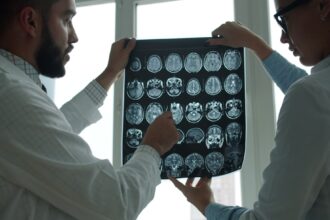Depersonalization and derealization are psychological phenomena that can leave you feeling detached from your own thoughts, feelings, or sense of self. When you experience depersonalization, you may feel as though you are an outside observer of your own life, as if you are watching yourself in a movie. This can lead to a profound sense of disconnection from your identity and emotions.
On the other hand, derealization involves a sense of unreality regarding your surroundings. You might perceive the world around you as strange, dreamlike, or distorted, making it difficult to engage with your environment fully. These experiences can be unsettling and confusing, often leading to anxiety and distress.
While they can occur in isolation, they are frequently associated with various mental health conditions, including anxiety disorders, depression, and post-traumatic stress disorder (PTSD). Understanding these phenomena is crucial for recognizing their impact on your life and seeking appropriate support when needed.
Key Takeaways
- Depersonalization and derealization are dissociative disorders that involve feeling disconnected from oneself and the world around them.
- Causes of depersonalization and derealization can include trauma, stress, anxiety, and substance abuse.
- Symptoms of depersonalization and derealization can include feeling like an outside observer of one’s thoughts and actions, and feeling like the world is unreal or distorted.
- Recognizing depersonalization and derealization in oneself or others involves paying attention to changes in perception, behavior, and emotional responses.
- Coping strategies for depersonalization and derealization can include mindfulness techniques, grounding exercises, and seeking professional help such as therapy or medication.
Causes of Depersonalization and Derealization
The causes of depersonalization and derealization can be complex and multifaceted. One common trigger is extreme stress or trauma. When faced with overwhelming situations, your mind may resort to these defense mechanisms as a way to cope with emotional pain.
This can happen during traumatic events, such as accidents or assaults, where the mind attempts to protect itself by creating a sense of detachment from the experience. Additionally, certain mental health conditions can predispose you to these feelings. Anxiety disorders, for instance, often manifest with symptoms of depersonalization and derealization as a response to heightened stress levels.
Substance use can also play a significant role; drugs like marijuana, hallucinogens, or even alcohol can induce feelings of unreality. Understanding these causes can help you identify potential triggers in your own life and take steps to address them.
Symptoms and Effects of Depersonalization and Derealization

The symptoms of depersonalization and derealization can vary widely from person to person. You might experience a sense of emotional numbness or a feeling that your body is not your own. This disconnection can lead to difficulties in forming relationships or engaging in daily activities.
You may find it challenging to concentrate or feel present in conversations, which can further exacerbate feelings of isolation. The effects of these experiences can be profound. You may notice an increase in anxiety or depression as you grapple with the confusion and fear that often accompany depersonalization and derealization.
This can create a vicious cycle where the more you try to understand or control these feelings, the more intense they become. Recognizing these symptoms is essential for addressing them effectively and seeking the support you need.
How to Recognize Depersonalization and Derealization in Yourself or Others
| Signs of Depersonalization | Signs of Derealization |
|---|---|
| Feeling disconnected from your body or thoughts | Feeling like the world is distorted or unreal |
| Emotional numbness or lack of emotion | Perceiving objects as changing in shape, size, or color |
| Feeling like a robot or an outside observer of your life | Experiencing a sense of unreality or being detached from the environment |
| Difficulty connecting with others on an emotional level | Feeling like you’re in a dream or a fog |
Recognizing depersonalization and derealization in yourself or others can be challenging, especially since these experiences often manifest subtly. If you find yourself frequently questioning your reality or feeling disconnected from your emotions, it may be a sign that you are experiencing these phenomena. You might notice that familiar places seem strange or that conversations feel distant, as if you are observing rather than participating.
When it comes to recognizing these symptoms in others, pay attention to changes in behavior or communication. A friend who once engaged enthusiastically may seem withdrawn or detached. They might express feelings of confusion about their identity or describe their surroundings in a way that suggests they are not fully present.
Being aware of these signs can help you approach the situation with empathy and understanding.
Coping Strategies for Depersonalization and Derealization
Coping with depersonalization and derealization requires a multifaceted approach tailored to your individual needs. One effective strategy is grounding techniques, which help anchor you in the present moment. This could involve focusing on your breath, engaging your senses by noticing the textures around you, or practicing mindfulness exercises that encourage awareness of your body and surroundings.
Another helpful approach is maintaining a routine that includes self-care practices such as regular exercise, healthy eating, and sufficient sleep. These lifestyle choices can significantly impact your mental well-being and help reduce feelings of anxiety that may trigger depersonalization or derealization. Journaling can also be beneficial; writing about your experiences allows you to process your thoughts and emotions more clearly.
Seeking Professional Help for Depersonalization and Derealization

If you find that depersonalization and derealization are significantly impacting your daily life, seeking professional help is a crucial step toward recovery. Mental health professionals can provide valuable insights into your experiences and help you develop coping strategies tailored to your needs. Therapy options such as cognitive-behavioral therapy (CBT) have shown effectiveness in treating these symptoms by addressing negative thought patterns and promoting healthier coping mechanisms.
In some cases, medication may also be recommended to help manage underlying anxiety or depression that contributes to these feelings. A psychiatrist can work with you to determine the best course of action based on your specific situation. Remember that seeking help is a sign of strength; taking this step can lead to greater understanding and relief from the distressing symptoms of depersonalization and derealization.
Supporting Someone with Depersonalization and Derealization
If someone close to you is experiencing depersonalization or derealization, offering support can make a significant difference in their journey toward healing. Start by creating a safe space for open communication; let them know that you are there to listen without judgment. Encourage them to express their feelings and experiences, validating their emotions rather than dismissing them as mere “phases” or “overreactions.” Additionally, educate yourself about these phenomena so that you can better understand what they are going through.
This knowledge will enable you to provide informed support while also recognizing when professional help may be necessary. Be patient; recovery from depersonalization and derealization can take time, and your consistent presence can be a source of comfort during this challenging period.
Finding Community and Resources for Depersonalization and Derealization on Quora
Quora offers a unique platform for individuals seeking community support and resources related to depersonalization and derealization. By engaging with others who share similar experiences, you can gain valuable insights into coping strategies and personal stories that resonate with your own journey. The anonymity of online platforms allows for open discussions about sensitive topics without fear of judgment.
You can explore various topics related to mental health on Quora, including personal anecdotes from those who have navigated similar challenges. Engaging with this community not only provides a sense of belonging but also empowers you with knowledge about available resources, coping techniques, and professional help options. Remember that you are not alone in this experience; connecting with others who understand can be an essential part of your healing process.
In conclusion, understanding depersonalization and derealization is vital for recognizing their impact on your life or the lives of those around you. By exploring the causes, symptoms, coping strategies, and available support systems, you can take proactive steps toward managing these experiences effectively.
Depersonalization-derealization disorder is a complex mental health condition characterized by persistent feelings of detachment from one’s body or surroundings, often described as feeling like an outside observer of one’s life. For those seeking more information on this topic, an insightful article can be found on Unplugged Psychology’s website. This article delves into the nuances of depersonalization and derealization, offering valuable insights and coping strategies for those affected. To explore this resource further, you can visit the article by clicking on this link.
LEARN MORE About Depersonalization & Derealization
FAQs
What is depersonalization-derealization disorder?
Depersonalization-derealization disorder is a mental health condition characterized by feeling detached from oneself (depersonalization) and feeling detached from the world around them (derealization). It can be a distressing and disruptive experience for those who suffer from it.
What are the symptoms of depersonalization-derealization disorder?
Symptoms of depersonalization-derealization disorder may include feeling like an outside observer of one’s thoughts, feelings, and body, feeling like the world is unreal or distorted, and feeling emotionally numb or disconnected from one’s surroundings.
What causes depersonalization-derealization disorder?
The exact cause of depersonalization-derealization disorder is not fully understood, but it is believed to be related to a combination of biological, psychological, and environmental factors. Trauma, stress, anxiety, and certain personality traits may contribute to the development of the disorder.
How is depersonalization-derealization disorder diagnosed?
Depersonalization-derealization disorder is diagnosed based on a thorough assessment of the individual’s symptoms, medical history, and any underlying mental health conditions. A mental health professional, such as a psychiatrist or psychologist, can make a diagnosis and develop a treatment plan.
What are the treatment options for depersonalization-derealization disorder?
Treatment for depersonalization-derealization disorder may include psychotherapy, medication, and self-care strategies. Cognitive-behavioral therapy (CBT) and mindfulness-based approaches have shown to be effective in helping individuals manage their symptoms and improve their quality of life.
Can depersonalization-derealization disorder be cured?
There is no specific cure for depersonalization-derealization disorder, but with appropriate treatment and support, many individuals are able to effectively manage their symptoms and lead fulfilling lives. It is important for individuals to seek professional help and develop coping strategies to address their symptoms.




